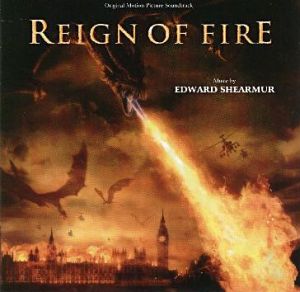Edward SHEAMUR
Reign of Fire
OST
VARÉSE SARABANDE VSD-6374 [50:38]

Having enjoyed Shearmur's work on The Count of Monte Cristo earlier this year, I was intrigued to know whether he would be able to consolidate his growing reputation with a worthwhile score for this fantasy action adventure. Thankfully the answer is in the affirmative.
Although there is a great deal of dissonant action/suspense music and not a lot else ('Enter the Dragon', 'Field Attack', 'Magic Hour' etc. etc.) it is all very capable and conjures the right amounts of apprehension and excitement. While admittedly it is not the most diverse soundtrack you will ever hear, the music certainly works and will serve its movie well. Best of all is the darkly rhythmic 'The Prologue', setting a serious-minded, grim tone that gives the entire work a sense of much needed gravity.
Not the easiest of listens, particularly for those who long for melody, but still a robust, intelligent score that further establishes Shearmur as a force to be reckoned with.
Mark Hockley

Paul Tonks adds:-
Dear Lord this an exhausting listen! Shearmur would appear to have been asked to expand upon Elliot Goldenthal's brand of bombast. Crashing and shrieking at every opportunity this is quite an assault on the ear. This isn't to say it isn't an engaging listen. Clearly this is a note-heavy, beautifully orchestrated work. The sheer volume elicited from the London Metropolitan Orchestra is impressive.
The movie's concept certainly suggests itself as a gift to a composer. Dragons overrun a decimated in a post-Apocalyptic London. Any composer hearing that pitch would no doubt jump at the opportunity. In this age of computer effects and teeth-shattering sound mixes, their enthusiasm is probably tempered with the knowledge that music will play a very secondary role to the other sensory tricks being focused on. Shearmur's answer seems to have simply been to mix Goldenthal with Wagner and crank the volume up. If the clanking metallic peaks or rumbling bass troughs couldn't make it through that sound mix, then nothing would!
Before this review sounds all-too repetitive in highlighting the noise factor, the 50 minutes are actually tempered with pauses for reflection. The first few minutes of "A Battle of Wills" is as the title suggests, an inner struggle assisted in its depiction on screen by gentle strings and flute accompaniment. At the very end in "Rebirth" that material is revisited for contrastingly gentle closure to the album.
In terms of Hollywood progression, this is the biggest step Shearmur has taken. The Charlie's Angels movies may be more high-profile projects, but this is the one to demo orchestral range with. All that's left to say is – watch those speakers!
Paul Tonks

Return to Index